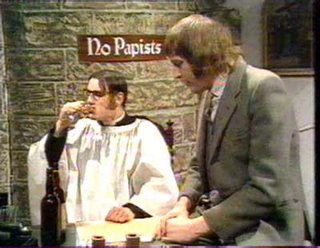
Having already given out this week's "Blight on Christendom" distinction, I was feeling generous, so I thought I would give out a special, non-recurring award for "Most Pretentious Sophistry" on the internet. This award was inspired by the folks at Reformedcatholicism.com and Communiosanctorum.com (same difference), so there was no contest, nor were there any runners-up. Hereafter, I will refer to them simply as the "Fops" (Flowery, Odd Postmoderns) for shorthand.
For those are unaware, this smaller-than-the-Branch-Davidian sect of theological moonbats have emerged in the last few years as the product of Federal Vision movement (a.k.a. Auburn Avenue theology). Now, I am not a fan of FV/AA theology, but I don't consider it heresy and I have no small admiration for some of it's adherents and teachers, most especially Douglas Wilson, from whom I have gained much spiritually. This movement, sadly, has spawned the Fops, the illegitimate love child of the FV/AA theology and postmodernism. Throw in a dash of medievalism, and you get the Kevin Johnson-Tim Enloe-Paul Owen joint project at the aforementioned websites. This peculiar creation is so strange that even its own parents wouldn't love it, or even recognize it. "Jesus I know, and Douglas Wilson I recognize, but who are you?" I say to the Fops.
For a case in point, one will note the constant postmodernism-inspired ridicule of propositions from Tim Enloe. He means to tell us that we are all ridiculous for thinking that propositions can be "beamed" between brains and that this somehow (?) denies incarnation of the Word. Yet we get this from Douglas Wilson's blog recently:
A proposition is simply a statement of fact, and the fact that God allows us to
see things in the world, and transfer what we see into the minds of others by
this means, is simply a grand mystery and miracle, right up there with the
loaves and fishes. Here I am, sitting with my laptop, listening to the blues,
and depositing thoughts into your head. How does that work? This does not
explain things fully, but one of the necessary instruments involved in all this
is the lowly proposition.
If these words were spoken by anyone else, the Fops would immediately decry such a fellow as being a disembodied-from-the-physical-world gnostic. They will at this point have to admit that their own hero is probably a closet gnostic sectarian baptist. I encourage people to read Wilson's critiques of postmodernism on his blog, as he has dedicated an ongoing series of posts to the topic. Anyone who takes his insights here seriously should run away from the Fops just as quickly as they run away from their equally-disturbing cousins, the
Emergents. One thing is for sure, and that is that the Fops have come a long way from their roots.
Calling themselves "Reformed Catholics", they have spoiled a perfectly good phrase, etymologically speaking. I'd also like to call myself a Reformed Catholic, and I would consider it accurate, but without implying that I embrace the hyper-covenantalism, hyper-sacramentalism, and hyper-ecclesiology of the Fops. The upshot of this is that "catholicity" becomes a codeword for "lack of discernment in the name of unity" or "muddled postmodern eclecticism." The Fops are clearly in love with this sophistic eclecticism, yet they are predictably not so tolerant of those who disagree with their undiscerning toleration. In addition, they display a shocking immunity to criticism. Note, for instance, Steve Hays' refutation of Paul Owen's errors, James White's refutations of Owen's errors, Eric Svendsen's refutations of Owen's errors, etc. He's like the Black Knight in Monty Python and the Holy Grail who, after getting his limbs hacked off by King Arthur, declares that its "only a flesh wound." I'd similarly begin to document those who have admonished Tim Enloe, but I'm just not up to such a monotonous task (just keyword search his name at triablogue, ntrmin.org, or aomin.org). But that's not all! It takes alot more than that to win a prestigious Mongrel Horde Award! Gaze in awe upon the
ad hominem sophistry that would, in sound churches, qualify as a disciplinable offense against brethren in Christ. Be astounded at the degeneration into heterodoxy by the
denial of
penal substitution. Moan with disgust at the
outright denial of justification by faith alone (and the cognitive dissonance involved in trying to confessionally square-up such hyper-sacramentalism).
I attempted dialogue with the Fops a year or two ago, which I soon learned was an excercise in futility on par with trying to tell a Palestinian suicide bomber that the Jews really aren't the root of societal evil. Seeing as how they were willing to extend the right hand of fellowship and regard Roman Catholics as "brothers" in Christ on the basis of their Trinitarian baptism, I questioned the arbitrariness of treating an issue of theology proper (the doctrine of the Trinity) as the minimum bar of orthodoxy while ignoring the soteriological issues (sola fide) of the Gospel. I agreed with their reasoning about Trinitarian baptism being the means of entrance into the visible church, but disagreed (on the basis of the example of the Galatian heresy) that a Trinitarian affirmation is the sole or sufficient determination of a 'credible profession of faith' at baptism. Shouldn't a credible profession of faith include, at least implicitly, an affirmation of what aforementioned Triune God has done for us? Their reasoning about the necessity of a Trinitarian confession is right as far as it goes. The question I asked was why stop there? Not shockingly, I was given no straight answer to this question, but instead a pile of patented Enlovian bluster.
So far, I've just given a thumbnail sketch of the Fops' merits as recipients of our prestigious award, but I don't want to let this post just be composed of ridicule, even as richly deserved as it is. I will therefore address one of the Fops' latest insults to the Reformed community's intelligence. This is just plucking out one of many such editorials, about as significant and difficult as finding hay in the proverbial haystack. My dear readers, you will have to thank me for reading their blog so that you don't have to. Kevin Johnson tells us that the upcoming debate on Calvinism, which will be a major feature of this year's SBC Pastor's Conference, is a bad thing. Here are some of his reasons:
I suppose I would be more positive about this debate if "Five Point Calvinism"
really represented what it means to be Reformed or if the debate centered on the
truths put forward by the Synod of Dort in a way that emphasized the relation of
these doctrines to the overall covenantal theological and catholic context of
Reformed Protestantism.
I don't know what thinking is leading him to the conclusion that the Canons or Dordt, a major confession of the Reformation, one of the 3 Forms of Unity, doesn't in an important sense "represent what it means to be Reformed." Secondly, we certainly should be concerned with theological and historical contexts or our confessions, but that doesn't mean we should hesitate to defend our confessions. Either the affirmations of the Canons are right or they are wrong. "Jesus is Lord" is also a confession, and it has its own theological and historical context to it. Would Mr. Johnson hesitate to defend this confession on similar grounds?
There are, for example, legitimate criticisms of the practice and the theology
of Five Point Calvinism by real Arminian theology that deserve to be considered
and mulled over in a non-polemic environment.
Funny, but the New Testament doesn't seem to prioritize establishing a "non-polemic environment" against first century errors in the church. So where does such an ethical priority come from?
Dr. Patterson will not be representing a true Arminian position. He certainly
won't be putting forward all of the historic
points of the Remonstrants and likely doesn't believe all of what they put
originally advocated in 1610.
True, but is the Deity of Christ, by extension, not worth defending today simply because Jehovah's Witnesses don't believe exactly as Arius did? Should we hesitate to debate and defend the Nicene Creed just because it was written in a particular historic context?
Dr. Patterson has already been called Arminian on other
blogs or lists as a result of being the one to take the side against Five Point
Calvinism. Of course, this is inaccurate in the extreme. It's a sort of
shorthand among Five Point Calvinists. By calling Dr. Patterson an Arminian,
what they really mean is that he's not a five point Calvinist and this sort of
sloppy use of vocabulary doesn't help us get to the truth of the matter any time
soon. It doesn't accurately cast Dr. Patterson's position or allow his position
to speak for itself.
Actually, it takes alot more to be an Arminian rather than simply denying the 5 Points. Some form of semi-Pelagianism, semi-semi-Pelagianism, or doctrine of libertarian free will is usually behind the rejection of however many points they may reject. Nor need they embrace all 5 Points of the Arminian Remonstrants in order for this to be true.
On the way things are phrased, the terms "Five Point Calvinism" and "Calvinism"
in general do not represent either Calvin's teaching or anything other than the
dogmatic 'TULIP' summary conclusions of the Synod of Dort.
Kevin doesn't tell us what he means when he denies that 5 Point Calvinism "represents" Calvin's teaching. This is his typical weasel way of not having to be specific about anything that can be criticized. Nothing specific, but only "in general" does it not represent Calvin's teaching. Uh-huh. Aren't the 5 Points either taught explicitly by Calvin, or at least by implication? OK, Calvin didn't pen the Canons or Dordt himself, but that's fairly trivial. And simply pointing out that the 5 Points only constitute a portion of his teaching is similarly trivial. Kevin's idolatry of generalities and love of vague abstractionism lead him to declare that "you have to see the forest, but there are no trees" in his disdain for particulars. Again, substitute any other doctrine into his equation and you see the absurdity of it: the Nicene Creed is not the totality of Trinitarian theology, but it would be false to suggest that it doesn't "represent" Trinitarian theology or somehow is not worth defending in debate.
I believe it's high time for the Reformed community to admit how divisive
so-called Five Point Calvinism has been in Baptist and other circles and
bringing additional light to this subject in the form of a debate will
perpetuate this sort of division in the Southern Baptist Convention.
This exposes just how much "catholicity" has become an idol for Johnson and his fellow Fops. Apparently, he doesn't think semper reformanda is so important anymore when his idol is threatened. Yes, division is bad and should be avoided, but not all reformations need be divisive. God commands us to both unity and doctrinal purity. The Fops will put purity on the back burner in order to fulfill John 17:11 (that the church would be one). Someone should tap them on the shoulder and tell them to obey everything God has commanded, including John 17:17 (that the church would be sanctified in truth). We don't get to disobey one command saying "well, I was just trying to fulfill this other command by doing so."
Southern Baptists need to understand how many
implementations of Five Point Calvinism in the life of churches limits and
hinders legitimate evangelism while promoting all sorts of division and schism.
Any honest look at Reformed churches in general will have to admit that
Calvinist churches on the whole are terrible at evangelism. The standard
'Arminian' critique here is absolutely correct. Five Point Calvinism as it has
been implemented in American churches does stunt evangelism.
Any doctrine can be "implemented" wrongly and lead to terrible results. The solution, therefore, is to implement a biblical truth rightly, not suppress or deny a biblical truth. The solution is to deal with sin, not deny inspired truth.
In short, Southern Baptists don't need the very doctrines that promise only to
kill not only the growth they've enjoyed so far but also their very identity as
the effective and hard-working evangelists for the Church of this modern age.
Southern Baptists should indeed be proud of their heritage, but again I wonder how this negates the importance of continually reforming. And what is this unbelieving fatalism about biblical doctrine "promising" to kill their growth? It is certainly a possibility, but why not do the right thing (preach truth amidst error) and let God decide if He will change the hearts unto unity, or whether He will bring a sword of division?
Category: Mongrel Medals
Read more!






















